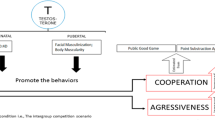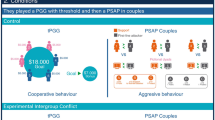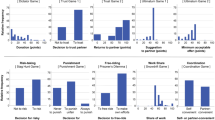Abstract
Both biosociological and psychological models, as well as animal research, suggest that testosterone has a key role in social interactions1,2,3,4,5,6,7. Evidence from animal studies in rodents shows that testosterone causes aggressive behaviour towards conspecifics7. Folk wisdom generalizes and adapts these findings to humans, suggesting that testosterone induces antisocial, egoistic, or even aggressive human behaviours. However, many researchers have questioned this folk hypothesis1,2,3,4,5,6, arguing that testosterone is primarily involved in status-related behaviours in challenging social interactions, but causal evidence that discriminates between these views is sparse. Here we show that the sublingual administration of a single dose of testosterone in women causes a substantial increase in fair bargaining behaviour, thereby reducing bargaining conflicts and increasing the efficiency of social interactions. However, subjects who believed that they received testosterone—regardless of whether they actually received it or not—behaved much more unfairly than those who believed that they were treated with placebo. Thus, the folk hypothesis seems to generate a strong negative association between subjects’ beliefs and the fairness of their offers, even though testosterone administration actually causes a substantial increase in the frequency of fair bargaining offers in our experiment.
This is a preview of subscription content, access via your institution
Access options
Subscribe to this journal
Receive 51 print issues and online access
$199.00 per year
only $3.90 per issue
Buy this article
- Purchase on Springer Link
- Instant access to full article PDF
Prices may be subject to local taxes which are calculated during checkout



Similar content being viewed by others
References
Mazur, A. & Booth, A. Testosterone and dominance in men. Behav. Brain Sci. 21, 353–363 (1998)
Mazur, A. Biosociology of Dominance and Deference (Rowman & Littlefield, 2005)
Josephs, R. A., Newman, M. L., Brown, R. P. & Beer, J. M. Status, testosterone, and human intellectual performance: stereotype threat as status concern. Psychol. Sci. 14, 158–163 (2003)
Josephs, R. A., Sellers, J. G., Newman, M. L. & Mehta, P. H. The mismatch effect: when testosterone and status are at odds. J. Pers. Soc. Psychol. 90, 999–1013 (2006)
Schultheiss, O. C., Campbell, K. L. & McClelland, D. C. Implicit power motivation moderates men’s testosterone responses to imagined and real dominance success. Horm. Behav. 36, 234–241 (1999)
Archer, J. Testosterone and human aggression: an evaluation of the challenge hypothesis. Neurosci. Biobehav. Rev. 30, 319–345 (2006)
Edwards, D. A. Early androgen stimulation and aggressive behavior in male and female mice. Physiol. Behav. 4, 333–338 (1969)
Björkqvist, K., Nygren, T., Björklund, A. C. & Björkqvist, S. E. Testosterone intake and aggressiveness - real effect or anticipation. Aggress. Behav. 20, 17–26 (1994)
Pope, H. G. & Katz, D. L. Homicide and near-homicide by anabolic-steroid users. J. Clin. Psychiatry 51, 28–31 (1990)
Dabbs, J. M., Carr, T. S., Frady, R. L. & Riad, J. K. Testosterone, crime, and misbehavior among 692 male prison-inmates. Pers. Individ. Dif. 18, 627–633 (1995)
Dabbs, J. M. & Hargrove, M. F. Age, testosterone, and behavior among female prison inmates. Psychosom. Med. 59, 477–480 (1997)
Fehr, E. & Fischbacher, U. The nature of human altruism. Nature 425, 785–791 (2003)
Camerer, C. F. Behavioral Game Theory: Experiments in Strategic Interaction (Princeton Univ. Press, 2003)
Güth, W., Schmittberger, R. & Schwarze, B. An experimental analyses of ultimatum bargaining. J. Econ. Behav. Organ. 3, 367–388 (1982)
Roth, A., Prasnikar, V., Okuno-Fujiwara, M. & Zamir, S. Bargaining and market behavior in Jerusalem, Ljubljana, Pittsburgh and Tokyo: An experimental study. Am. Econ. Rev. 81, 1068–1095 (1991)
Forsythe, R., Horowitz, J. L., Savin, N. E. & Sefton, M. Fairness in simple bargaining games. Games Econ. Behav. 6, 347–369 (1994)
Henrich, J. et al. In search of Homo economicus: behavioral experiments in 15 small-scale societies. Am. Econ. Rev. 91, 73–78 (2001)
Knoch, D. et al. Diminishing reciprocal fairness by disrupting the right prefrontal cortex. Science 314, 829–832 (2006)
Burnham, T. C. High-testosterone men reject low ultimatum game offers. Proc. R. Soc. B 274, 2327–2330 (2007)
Crockett, M. J. et al. Serotonin modulates behavioral reactions to unfairness. Science 320, 1739 (2008)
Tuiten, A. et al. Time course of effects of testosterone administration on sexual arousal in women. Arch. Gen. Psychiatry 57, 149–153 (2000)
Dabbs, J. M. et al. Saliva testosterone and criminal violence among women. Pers. Individ. Dif. 9, 269–275 (1988)
Purifoy, F. E. & Koopmans, L. H. Androstenedione, testosterone, and free testosterone concentration in women of various occupations. Soc. Biol. 26, 179–188 (1979)
Cashdan, E. Hormones, sex, and status in women. Horm. Behav. 29, 354–366 (1995)
Zethraeus, N. et al. A randomized trial of the effect of estrogen and testosterone on economic behavior. Proc. Natl Acad. Sci. USA 106, 6535–6538 (2009)
Kosfeld, M. et al. Oxytocin increases trust in humans. Nature 435, 673–676 (2005)
Wallace, B., Cesarini, D., Lichtenstein, P. & Johannesson, M. Heritability of ultimatum game responder behavior. Proc. Natl Acad. Sci. USA 104, 15631–15634 (2007)
van Honk, J. et al. A single administration of testosterone induces cardiac accelerative responses to angry faces in healthy young women. Behav. Neurosci. 115, 238–242 (2001)
van Honk, J., Peper, J. S. & Schutter, D. J. Testosterone reduces unconscious fear but not consciously experienced anxiety: implications for the disorders of fear and anxiety. Biol. Psychiatry 58, 218–225 (2005)
van Honk, J. et al. Testosterone shifts the balance between sensitivity for punishment and reward in healthy young women. Psychoneuroendocrinology 29, 937–943 (2004)
Derogatis, L. R. SCL-90-R, Administration, Scoring & Procedures Manual-I for the R(evised) Version (Johns Hopkins Univ. School of Medicine, 1977)
Stuenkel, C. A., Dudley, R. E. & Yen, S. S. Sublingual administration of testosterone-hydroxypropyl-β-cyclodextrin inclusion complex simulates episodic androgen release in hypogonadal men. J. Clin. Endocrinol. Metab. 72, 1054–1059 (1991)
Fischbacher, U. z-Tree: Zurich toolbox for ready-made economic experiments. Exp. Econ. 10, 171–178 (2007)
Coates, J. M. & Herbert, J. Endogenous steroids and financial risk taking on a London trading floor. Proc. Natl Acad. Sci. USA 105, 6167–6172 (2008)
Steyer, R., Schwenkmezger, P., Notz, P. & Eid, M. Der Mehrdimensionale Befindlichkeitsfragebogen (MDBF) (Hogrefe, 1997)
Laux, L., Glanzmann, P., Schaffner, P. & Spielberger, C. D. Das State-Trait-Angstinventar (Beltz, 1981)
Schwenkmezger, P., Hodapp, V. & Spielberger, C. D. Das State-Trait-Aergerausdruck-Inventar STAXI (Hans Huber, 1992)
Christie, R. & Geis, F. Studies in Machiavellism (Academic, 1970)
Goldberg, L. R. et al. The international personality item pool and the future of public-domain personality measures. J. Res. Pers. 40, 84–96 (2006)
Acknowledgements
This paper is part of the Research Priority Program ‘Foundations of Human Social Behaviour—Altruism versus Egoism’ at the University of Zurich. We also acknowledge support by the National Center of Competence in Affective Sciences, the Neurochoice Project of SystemsX, and the Swiss National Science Foundation. We thank F. Heusi for her research assistance during the conduct of the experiments.
Author Contributions C.E, E.F., M.H. and M.N. designed research; C.E. and R.S. conducted the experiment; C.E., E.F. and M.N. planned the data analysis; C.E. and M.N. performed data analysis; C.E., E.F., M.H. and M.N. wrote the paper.
Author information
Authors and Affiliations
Corresponding authors
Ethics declarations
Competing interests
The authors declare no competing financial interests.
Supplementary information
Supplementary Information
This file contains Supplementary Statistics and Results, a Supplementary Discussion, Supplementary Data and Supplementary References. (PDF 199 kb)
Supplementary Data
This file contains the Supplementary Data for this paper. (TXT 14 kb)
Rights and permissions
About this article
Cite this article
Eisenegger, C., Naef, M., Snozzi, R. et al. Prejudice and truth about the effect of testosterone on human bargaining behaviour. Nature 463, 356–359 (2010). https://doi.org/10.1038/nature08711
Received:
Accepted:
Published:
Issue Date:
DOI: https://doi.org/10.1038/nature08711
This article is cited by
-
Testosterone promotes dominance behaviors in the Ultimatum Game after players’ status increases
Scientific Reports (2023)
-
Psychosocial stress increases testosterone in patients with borderline personality disorder, post-traumatic stress disorder and healthy participants
Borderline Personality Disorder and Emotion Dysregulation (2021)
Comments
By submitting a comment you agree to abide by our Terms and Community Guidelines. If you find something abusive or that does not comply with our terms or guidelines please flag it as inappropriate.



